I can ride Tonka past the paddocks and into the woods, and he doesn’t give the barn a backward glance. He loads willingly into the trailer and looks forward to adventures off of the farm. We can arrive at a trail head where there are other horses, and he’ll sometimes neigh, sometimes not, and then not send them another look (although he’ll keep an ear on them just to stay aware of the surroundings.)
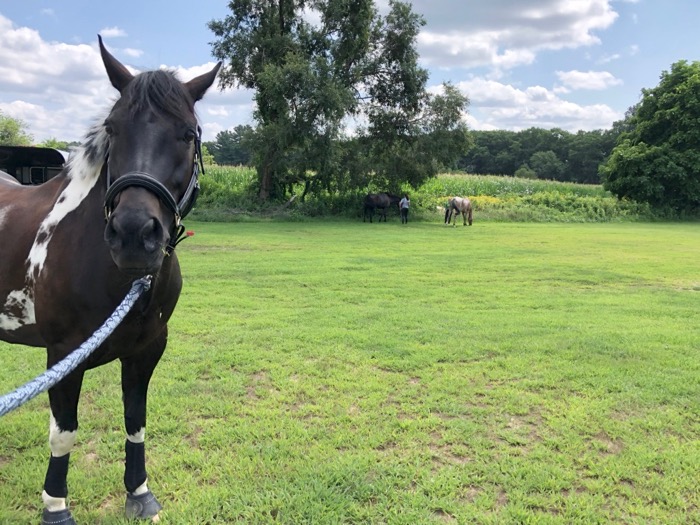
But even Tonka can show signs of being herd bound – behavior that can be frustrating and sometimes dangerous. We’ve all seen or experienced it. The horse that can’t bear to be a few lengths back on the trail and so dashes forward into the lead horse’s rump. The horse that you can’t take to a show with stablemates because all he’ll do is whinny his head off in front of the judge, with his nose in the sky, trying to catch a glimpse of his friends.
With Tonka, as with many horses, this behavior is situational. For Tonka, it depends on who he’s with. Although he hasn’t lived in the same barn with Maggie and Cider for almost two years, he’s still attached to them. The other day we met up for a trail ride. Tonka saw Maggie first, and then when he realized that Cider was in the trailer, too, he did the cutest high-pitched whinny of a hello.
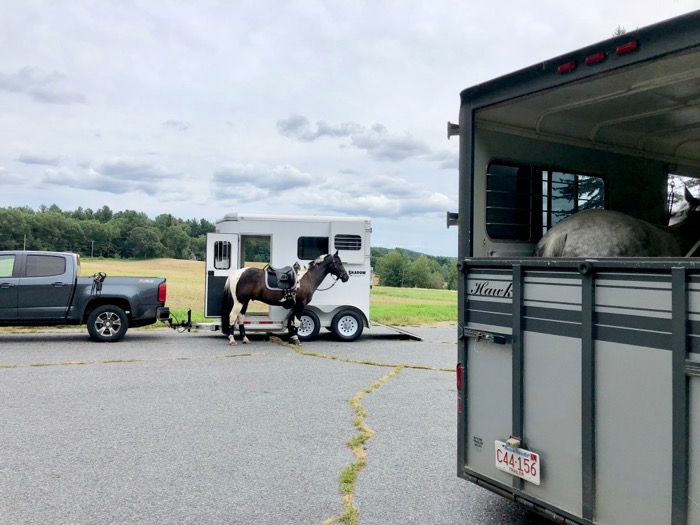
After the introductions, we busied ourselves tacking up. Maggie and Cider at their trailer, Tonka at mine. All was fine until both of his friends were out of sight on the far side of their trailer, at which time Tonka immediately went into alert. He’s trained to stay tied, and to stay calm. I’d worked on that when there weren’t distractions, and then later at busy shows. But this was one criteria too much. I could see the tension building in his body.
Punishing Tonka to force him to stand still (by jerking his lead and shoving his body over) would have heightened his anxiety. So, instead, I walked him over to where his friends were and then took him back to his trailer. Now he understood that although they were not in view, they were still there. We were able to finish tacking up and go off for our ride.
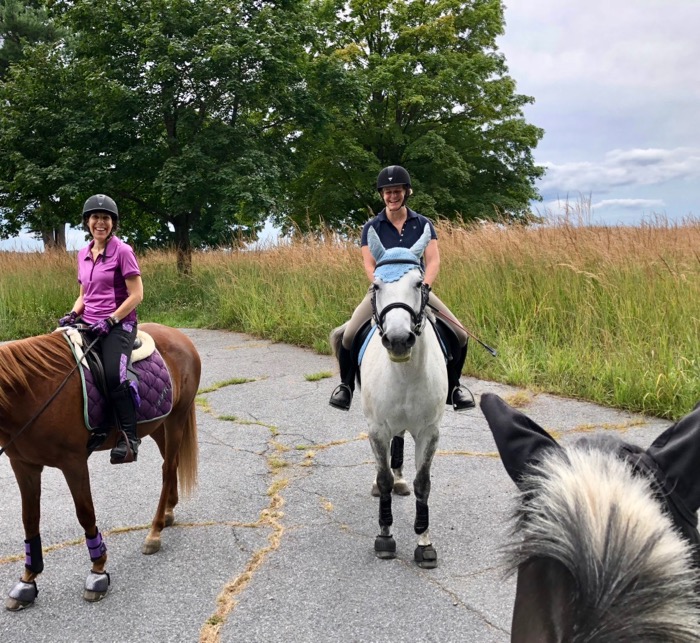
I was able to work through this with Tonka with the minimum of drama because we started from a base of emotional security. Most of our horses have lived through severe separations, which cause lifelong bouts of anxiety. Understand that and you can be more empathic.
In natural, free-roaming feral herds, in which the horses determine their social groups, mares wean their foals from suckling, but the youngsters are not sent off until they are around two years of age. At that point, they might join a roaming band of bachelors, or a filly might be integrated into another band. In contrast, our domesticated horses often start out in a small space, with only their mothers for company, rather than in a herd, where there are multiple friends and adults that create a broad safety net. Then, our “hand-raised foals” go through an early and often severe weaning, usually before they are six months old, when they are removed suddenly from their dams. After that they don’t get to be part of a new long-term group, but are isolated, or put into frequently changing social situations. This sets them up for lifelong insecurity.
Tonka was fortunate in that for his first few years he grew up in a close-knit family group, including Aunties and siblings, on a ranch, which is why he isn’t prone to panic, and is thoughtful when faced with challenges.
Still, leaving one’s horse friends in a calm manner takes training, even for a horse like Tonka. In the past, Maggie’s owner and I have worked in a large area, riding loops away from and back to each other, then going out of sight for the briefest of moments, then returning. That helps, somewhat, to ease stress on trail rides.
But the reality is that it’s difficult to train to overcome herd-bound anxiety. You have to enlist the help of not only your human friend, but also a horse that is your horse’s friend. You need to set up the situation so that it is realistic but still safe for everyone involved. It takes a lot of small steps and time. It’s not achievable for everyone. I know how to do all of this and I haven’t been able to complete Tonka’s training!
It’s actually easier for Tonka and I to go out on our own. We form a herd of two, which isn’t unlike the situation an older stallion might find himself in. But, even then, if I find myself daydreaming, and fall out of sync with Tonka, he tenses. He knows when I’m there for him and when I’m not. Riding keeps me in the present moment with my horse.
Being alone isn’t a natural state for a horse. Being left behind is downright dangerous for a herd animal. When your horse “acts up,” understand how frightening the situation is for them. When I do ride with my friends, we all check in with each other and make sure that one horse isn’t falling too far behind, or that the horse in front doesn’t have too much of a lead. (Maggie has a super walk that the rest of us can’t possibly match.) We’d rather prevent moments of panic, than to have to react to them when they’re happening. When I got Tonka, I didn’t realize how sudden and severe that herd-bound anxiety could arise in him. A few months into owning Tonka, out on a trail, he broke into a trot to catch up to the horse in front. I wanted him to keep walking and told him so with hands and seat. I wasn’t severe, but Tonka felt the restriction of the reins and cut a couple of bucks worthy of a rodeo horse. I went airborne, but luckily, came right back down in the center of the saddle and not off!
Over time, I’ve taught Tonka to respond willingly when I ask him to slow down on the trail. We’ve worked on patience when his buddies go out of sight. We’re a few years past that first rodeo, but I don’t assume that it will never happen again. (In fact, it has!) I try to stay aware of moments where I can enlarge Tonka’s safety bubble. When Tonka is relaxed, I might ask him to hang back a bit more than usual, and then before he thinks to rush up to his friend, I’ll ask him to walk bigger to catch up. I try to teach him that what I ask for is reasonable, and that I’ll never put him in danger.
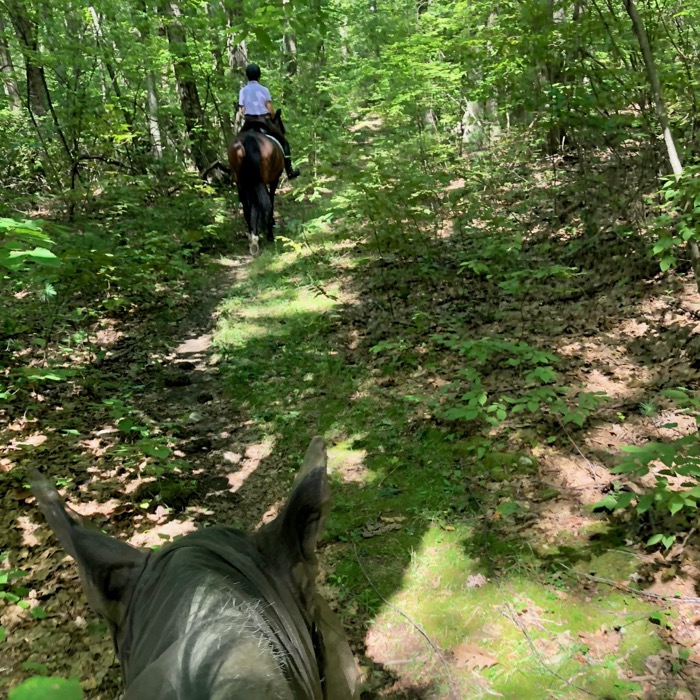
Here’s an example. Sometimes, a friend and I ride in a big field. She does big canter circles. Tonka and I watch. At first Tonka worries that she’s galloping away from him, but then he sees that she always comes back. This instills confidence. When Tonka feels calm under me, I ask him to trot in the opposite direction and then return. These small moments of training add up. It won’t change the horse’s basic nature, but it does teach them how to cope – and thrive – in the world that we’ve created.
Notice that I’ve said nothing about me being the “dominant” herd member and telling my horse where to move his feet. That’s because that just doesn’t happen in real life with horses. Horses live in cooperative bands and move in sync, without one leader. For more about this and research on the ethology of horses, read Horses in Company by Lucy Rees.
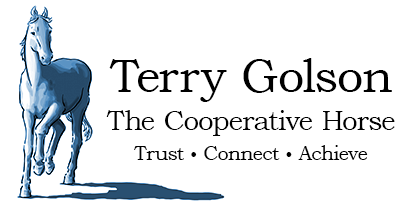

“Lived through severe separations” – so true of so many animals. I’m aware of what being taken away from a mother, siblings, and/or buddy can do to an animal, and with my dogs and cats I make an ongoing effort to restore their security and make sure they feel loved and involved and a true member of the family. Tonka is so lucky to have you.
Yes, dogs and cats, too, care about friends and separation. Knowing how to alleviate their stress takes tact! Good for you to be aware and make the effort.
Well written, and ever so true. Any of us that have ridden for a long time have been in almost every situation you have described including an amazingly good barrel horse in a practice situation we used to have, but totally got too excited at shows with all the people and other horses and messed up royally. He became an excellent trail horse.
Then there was my other horse that bit the judge in a halter class, among other things, he became a trail horse also. And since trail riding is what I do mostly, that was fine with me. I kept both those horses until they died in their 30’s.
I’m sorry Tonka messes up occasionally, but it’s always good to hear how you fixed the situation. We can never stop learning.
Sometimes it doesn’t matter how good a trainer you are, or how attached your horse is to you, sometimes they’re simply not suited to an activity. So smart of you to find what they are good at, and to celebrate that. My dog, Lily, told me right off that her place was at home and not on the agility course. Physically, she would have been brilliant, but her mind wasn’t there.
Ah yes, this situational herd-bound-ness rears its ugly head when we go horse-camping. No horse (at least not MY horse) wants to be abandoned in the wilderness (where there are lions and tigers and bears, oh my!) by the “herd” he came with!
Where you go camping there are lions (puma) and bears! I’d worry if the horse wasn’t on the alert and wanting to be with the herd 🙂